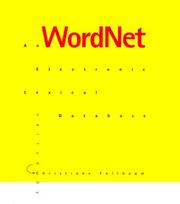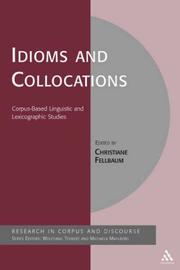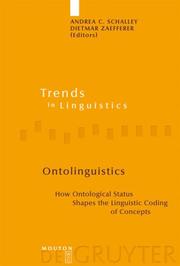| Listing 1 - 10 of 22 | << page >> |
Sort by
|

ISBN: 026206197X 9780262272551 9780262061971 0262272555 Year: 1998 Publisher: Cambridge, Mass. MIT Press
Abstract | Keywords | Export | Availability | Bookmark
 Loading...
Loading...Choose an application
- Reference Manager
- EndNote
- RefWorks (Direct export to RefWorks)
Lexicology. Semantics --- Mathematical linguistics --- Artificial intelligence. Robotics. Simulation. Graphics --- English language --- Semantics --- Lexicology --- Data processing --- -Lexicology --- -Semantics --- -Formal semantics --- Semasiology --- Semiology (Semantics) --- Comparative linguistics --- Information theory --- Language and languages --- Meaning (Psychology) --- Germanic languages --- Data processing. --- -Data processing --- Computational linguistics --- Electronic data processing --- WordNet. --- Word net --- Semantics - Data processing --- Lexicology - Data processing --- English language - Data processing --- SEMANTICS --- LEXICOLOGY --- ENGLISH LANGUAGE --- DATA PROCESSING

ISBN: 9780826489944 082648994X Year: 2007 Publisher: London Continuum
Abstract | Keywords | Export | Availability | Bookmark
 Loading...
Loading...Choose an application
- Reference Manager
- EndNote
- RefWorks (Direct export to RefWorks)
Lexicology. Semantics --- Mathematical linguistics --- German language --- #KVHA:Taalkunde; Duits --- #KVHA:Corpuslinguistiek; Duits --- #KVHA:Lexicografie; Duits --- Collocation (Linguistics) --- Corpora (Linguistics) --- English language --- Idioms. --- Collocation (Linguistics). --- Corpora (Linguistics). --- Corpus-based analysis (Linguistics) --- Corpus linguistics --- Linguistic analysis (Linguistics) --- Semantics --- Semantic prosody --- Idioms --- Idioms, corrections, errors --- Germanic languages
Book
ISBN: 9780826444738 0826444733 Year: 2007 Publisher: London Continuum
Abstract | Keywords | Export | Availability | Bookmark
 Loading...
Loading...Choose an application
- Reference Manager
- EndNote
- RefWorks (Direct export to RefWorks)
Corpora (Linguistics) --- English language --- German language --- Collocation (Linguistics) --- Idioms --- 803.0-3 --- Corpus-based analysis (Linguistics) --- Corpus linguistics --- Linguistic analysis (Linguistics) --- Semantics --- Semantic prosody --- 803.0-3 Duits: lexicografie --- Duits: lexicografie --- Idioms, corrections, errors --- Germanic languages --- English language - Idioms --- German language - Idioms
Book
Year: 1986 Publisher: Bloomington, Ind. Indiana University Linguistics Club
Abstract | Keywords | Export | Availability | Bookmark
 Loading...
Loading...Choose an application
- Reference Manager
- EndNote
- RefWorks (Direct export to RefWorks)
Book
ISBN: 0262292955 0585371717 Year: 1998 Publisher: Cambridge, Mass : [Piscataqay, New Jersey] : MIT Press, IEEE Xplore,
Abstract | Keywords | Export | Availability | Bookmark
 Loading...
Loading...Choose an application
- Reference Manager
- EndNote
- RefWorks (Direct export to RefWorks)
with a preface by George Miller WordNet, an electronic lexical database, is considered to be the most important resource available to researchers in computational linguistics, text analysis, and many related areas. Its design is inspired by current psycholinguistic and computational theories of human lexical memory. English nouns, verbs, adjectives, and adverbs are organized into synonym sets, each representing one underlying lexicalized concept. Different relations link the synonym sets.The purpose of this volume is twofold. First, it discusses the design of WordNet and the theoretical motivations behind it. Second, it provides a survey of representative applications, including word sense identification, information retrieval, selectional preferences of verbs, and lexical chains.Contributors : Reem Al-Halimi, Robert C. Berwick, J. F. M. Burg, Martin Chodorow, Christiane Fellbaum, Joachim Grabowski, Sanda Harabagiu, Marti A. Hearst, Graeme Hirst, Douglas A. Jones, Rick Kazman, Karen T. Kohl, Shari Landes, Claudia Leacock, George A. Miller, Katherine J. Miller, Dan Moldovan, Naoyuki Nomura, Uta Priss, Philip Resnik, David St-Onge, Randee Tengi, Reind P. van de Riet, Ellen Voorhees.
WordNet. --- Semantics --- Lexicology --- Data processing. --- Data processing. --- WordNet.
Book
ISBN: 6610704848 1280704845 9786610704842 1429455292 1607502119 6000004281 143370126X 9781429455299 Year: 2006 Publisher: Amsterdam Washington, DC IOS Press
Abstract | Keywords | Export | Availability | Bookmark
 Loading...
Loading...Choose an application
- Reference Manager
- EndNote
- RefWorks (Direct export to RefWorks)
Aims to provide a forum for genuine interdisciplinary exchange in the spirit of a unified effort towards solving the problems of ontology, with an eye to both theoretical issues and concrete applications. This book contains a range of areas, all of which are important to the development of formal ontologies.
Book
Year: 1982 Publisher: Ann Arbor, Mich. University Microfilms International
Abstract | Keywords | Export | Availability | Bookmark
 Loading...
Loading...Choose an application
- Reference Manager
- EndNote
- RefWorks (Direct export to RefWorks)
Book
Year: 1989 Publisher: Bloomington, Ind. Indiana University Linguistics Club
Abstract | Keywords | Export | Availability | Bookmark
 Loading...
Loading...Choose an application
- Reference Manager
- EndNote
- RefWorks (Direct export to RefWorks)
Lexicology. Semantics --- Grammar --- Comparative linguistics --- English language --- French language
Book
Year: 1980 Publisher: Ann Arbor Xerox university microfilms international
Abstract | Keywords | Export | Availability | Bookmark
 Loading...
Loading...Choose an application
- Reference Manager
- EndNote
- RefWorks (Direct export to RefWorks)


ISBN: 9783110189971 3110189976 9786612194153 1282194151 3110197790 9783110197792 9781282194151 6612194154 Year: 2008 Volume: 176 Publisher: Berlin Boston
Abstract | Keywords | Export | Availability | Bookmark
 Loading...
Loading...Choose an application
- Reference Manager
- EndNote
- RefWorks (Direct export to RefWorks)
Current progress in linguistic theorizing is more and more informed by cross-linguistic (including cross-modal) investigation. Comparison of languages relies crucially on the concepts that can be coded with similar effort in all languages. These concepts are part of every language user's ontology, the network of cross-connected conceptualizations the mind uses in coping with the world. Assuming that language comparability is rooted in the comparability of user ontologies, the idea of the present volume is to further instigate progress in linguistics by looking behind the interface with the conceptual-intentional system and asking a still underexplored question: How are ontological structures reflected in intra- and cross-linguistic regularities? This question defines the research program of ontology based linguistics or ontolinguistics. Recent advances in the theory of language have been characterized by an emphasis on external explanatory adequacy and thus on relating language to other phenomena. The research program introduced in this volume adds a decisively distinct and fresh aspect to this emerging new contextualization of the field by bringing together insights from different areas, mainly linguistics, but also neuroscience, philosophy, and artificial intelligence. In providing these disciplines with a new common task, the exploration of the impact of ontological structures on linguistic regularities, the ontolinguistic approach promises to develop into a vital branch of cognitive science. Documenting the beginnings, the book aims to instigate future interdisciplinary research in this area. It will be of interest to researchers in linguistics, artificial intelligence, philosophy, and cognitive science in general.
Metaphysics --- Linguistics --- Linguistics. --- Ontology. --- Concepts. --- Linguistique --- Ontologie --- Concepts --- Ontology --- #KVHA:Linguïstiek --- #KVHA:Ontolinguïstiek --- #KVHA:Ontologie --- Being --- Philosophy --- Necessity (Philosophy) --- Substance (Philosophy) --- Linguistic science --- Science of language --- Language and languages --- Concept formation --- Abstraction --- Knowledge, Theory of --- Perception --- Psychology --- Cognitive Linguistics. --- computational linguistics. --- lexicology. --- semantics. --- typology (language).
| Listing 1 - 10 of 22 | << page >> |
Sort by
|

 Search
Search Feedback
Feedback About UniCat
About UniCat  Help
Help News
News